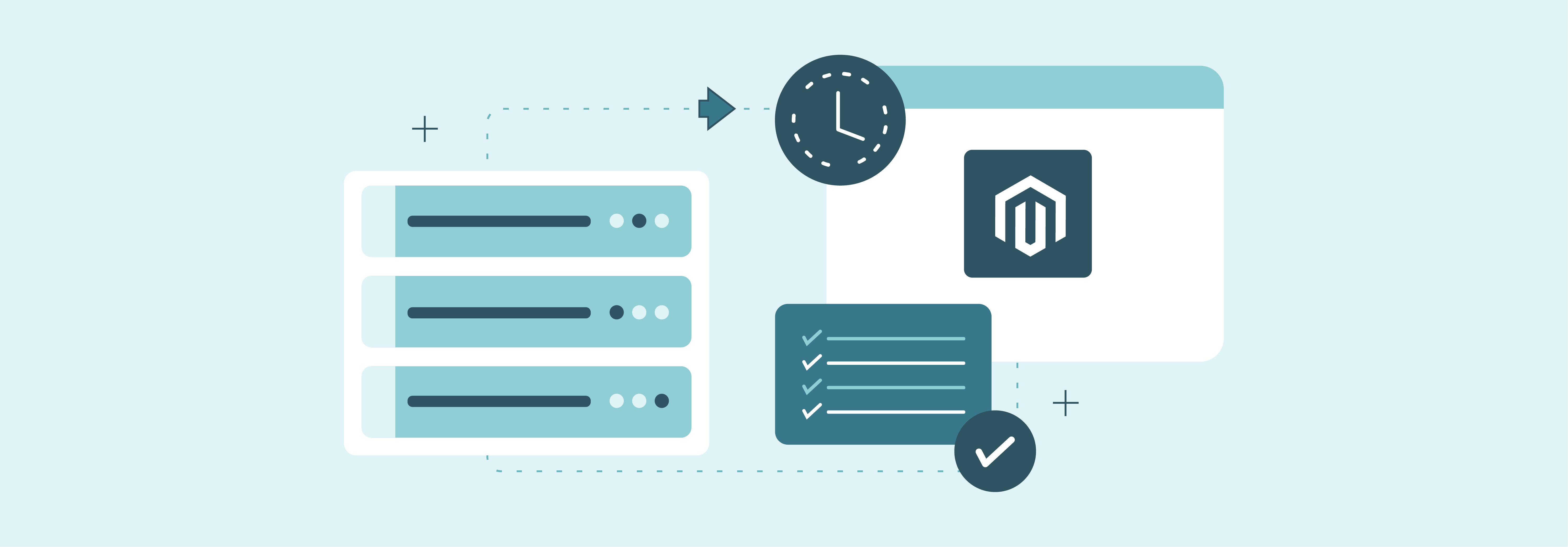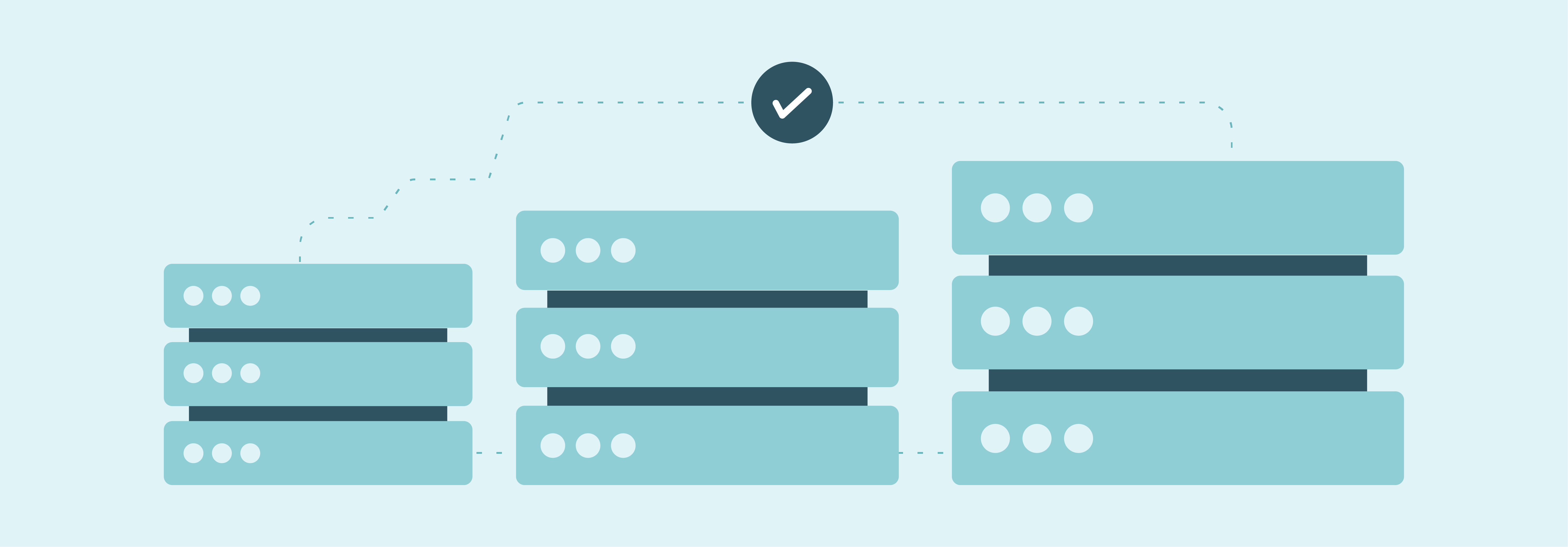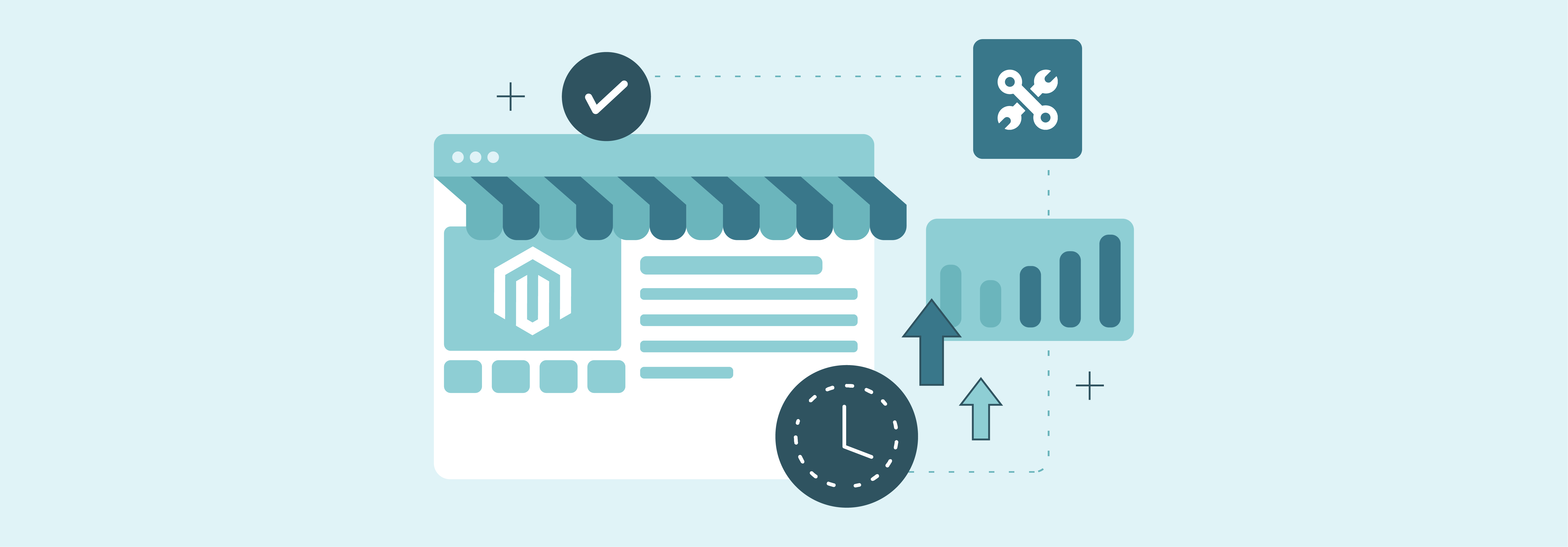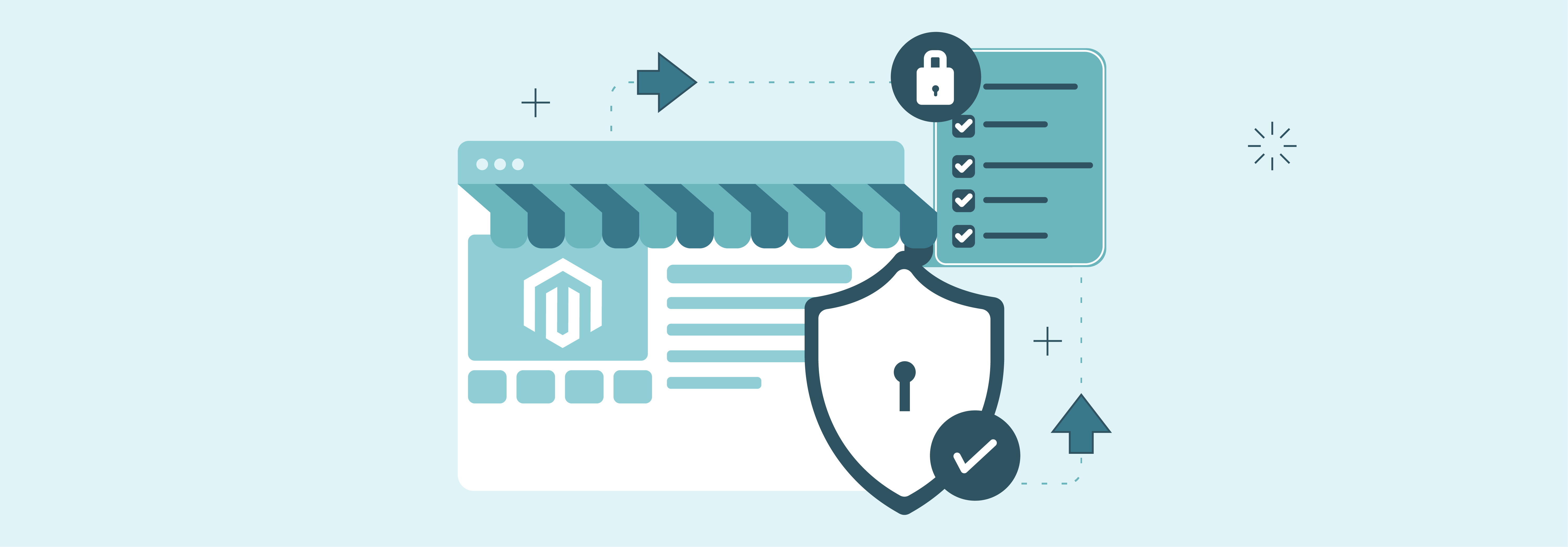
Choosing a Magento Hosting Company: 10 Performance Metrics to Evaluate
Evaluating Magento 2 hosting providers through key performance metrics helps you choose the right company to meet your online store's needs. With a managed Magento hosting provider, you get optimized page loading, server configurations, and automatic Magento scalability. This article explains ten performance metrics that help you choose a Magento hosting provider.
Key Takeaways
-
Managed Magento hosting scales for fluctuating traffic, maintaining peak performance.
-
Server setups with Nginx/Apache, SSDs, and caching boost site speed.
-
Security with SSL, patches, and expert support to ensure data safety.
-
24/7 support for technical issues and smooth user experience.
-
Backups and recovery for data integrity and quick restoration in case of loss.
Importance of Choosing the Right Magento Hosting Company
1. Scalability: Managed Plans That Grow with You
Managed Magento hosting plans are designed with scalability. They are ideal for businesses that experience fluctuating visitor numbers. Such plans allow store owners to adjust resources easily.
This ensures your e-commerce site remains responsive even during traffic spikes. It guarantees the hosting service can meet your needs without a drop in performance. This holds during the peak holiday season or a regular business day.
2. Pricing Flexibility: Hosting Services Tailored to Your Budget
The cost of Magento hosting can vary significantly. Price comparison among different hosts is important. Look for a hosting plan that provides value and fits within your budget.
Successful businesses find a hosting service that balances cost with necessary features. This may include an SSL certificate or a dedicated IP. It offers both affordability and quality.
3. Customization: Control Panel and Server Options
VPS Magento hosting offers more power over the server environment than shared web hosting plans.
This allows customization of stack components such as Nginx, Apache, and Elasticsearch to meet specific performance needs.
4. Speed: Nginx/Apache and Optimal Stack Configuration
Your hosting plan should use efficient web server technology like Nginx or Apache for optimal site performance.
The right stack configuration will ensure your Magento application runs quickly. Fast loading times could differentiate between a sale and a lost customer.
5. Security: Robust Protection for Your E-commerce
Security features protect against data breaches and cyber-attacks. Seek hosting plans with comprehensive Magento firewall protection, malware scanning, and standard SSL certificates. These measures safeguard both your business data and customers' information.
6. Expert Support: Access to Skilled Developers and Technicians
Good Magento hosting companies offer expert support at your fingertips. This immediate help from skilled developers is needed for tasks like stack installation or configuration adjustments. Server monitoring by professionals ensures prompt identification and resolution of potential issues.
6. High Availability: Ensuring Your Store Is Always Open
Uptime is essential for Magento stores. Every minute your site is down, sales are lost. High-quality hosting plans ensure availability. They offer reliable infrastructure with failover systems and real-time backups.
Choosing a hosting company with a proven track record of high uptime rates is essential for maintaining a live store without interruptions.
7. Easy Setup: Simplified Installation and Migration Processes
For many, the simplicity of initial installation and site migration are key factors when selecting a hosting service. Hosting providers often provide one-click installation and streamline the migration process. This makes it easy for anyone to set up or move their store, especially appealing to less technical store owners.
8. Additional Services: Value-Added Features That Set Providers Apart
Finally, consider the additional services offered by hosting companies. They can increase the value of your investment. These services can range from free domain registration to enhanced site migration support.
Also, look for management tools like Elasticsearch and added features like IP address whitelisting. These extras can significantly impact the overall hosting value you receive for the price.
10 Key Performance Metrics to Evaluate a Magento Hosting Company
1. Page Load Times

Page load time refers to the duration from clicking on a website link to displaying the page's entire content on the requesting browser. Maintaining low page load times prevents user drop-off for Magento stores, where pages are typically rich with high-resolution images and extensive product catalogs.
A fast-loading website enhances user experience, leading to higher engagement, longer browsing sessions, and increased sales.
Impact on SEO, Bounce Rates, and Conversions
-
SEO: Search engines like Google consider page speed as a ranking factor. Faster websites rank higher in search results, making them more visible to potential customers.
-
Bounce Rates: There's a direct correlation between page load times and bounce rates. Sites that take longer to load have higher bounce rates, as users often need more patience to wait.
-
Conversions: Conversion rates also suffer with slow-loading pages. Even a one-second delay can significantly reduce customer satisfaction and reduce conversions.
Evaluating Hosting Providers
a. Benchmark Standards for Magento Stores
Ideal page load times for Magento stores should be under 2 seconds. However, achieving sub-second load times can dramatically enhance user experience and engagement. Hosting providers should be evaluated based on their ability to support these speed benchmarks consistently, even during peak traffic periods.
b. Tools for Testing Page Load Times
- Google PageSpeed Insights: Offers a comprehensive analysis of a page's content and provides suggestions for improvement.
- GTmetrix: Combines Google PageSpeed Insights and YSlow scores, providing actionable recommendations.
- Pingdom: Allows you to test the load time of a page from different locations and provides insights into each element's loading duration.
Technical Enhancements
a. Importance of SSD Storage
SSDs (Solid State Drives) offer faster data access than traditional HDDs (Hard Disk Drives). This speed is essential for database and application files, impacting page load time.
Hosting solutions featuring SSD storage can significantly reduce the time it takes to retrieve content from the database and serve it to the user, thus improving the site's responsiveness.
b. Configuration of Caching Mechanisms (Varnish, Redis)
-
Varnish Cache: An HTTP accelerator designed for content-heavy dynamic websites. When properly configured for Magento, Varnish can serve pages much faster than reading them from the database, reducing the server's workload and speeding up page load time.
-
Redis: An in-memory data structure store used as a database, cache, and message broker. For Magento, Redis can be used to cache database calls, session storage, and page elements, decreasing the time needed to generate a page view.
Implementing these caching solutions requires careful configuration to ensure compatibility with Magento's architecture and to achieve the optimal balance between dynamic content delivery and caching efficiency.
2. Server Response Time

How Server Response Time Affects User Experience
-
Server response time refers to how quickly a server provides the first byte of content after a request is made. A slow server response can lead to noticeable delays in page loading, negatively affecting user engagement and satisfaction.
-
Users expect fast, responsive interactions. Delays can lead to frustration, reducing the likelihood of users completing purchases or returning to the site.
Correlation with Page Load Times
-
Server response time is a component of overall page load time. While page load time includes all content-loading processes, the server's initial response sets the pace for everything that follows.
-
Improving server response time can significantly reduce page load times, contributing to a smoother and more engaging user experience.
Tools and Methods to Measure Server Response Time
-
WebPageTest: Offers detailed performance insights from multiple locations globally, including server response times.
-
Pingdom: Provides a simple, user-friendly interface for monitoring website speed and server response.
-
Google PageSpeed Insights: While focused on page load times, it also offers insights into server configuration improvements.
Optimization Strategies
Role of Content Delivery Networks (CDN)
-
CDNs distribute website content across a network of servers worldwide, allowing users to load data from a geographically closer server. This can significantly reduce server response times by minimizing the distance data must travel.
-
Implementing a Magento CDN can also reduce the load on the origin server, allowing it to respond more quickly to new requests.
Impact of PHP Version and Memory Limits
-
PHP Version: Newer versions of PHP include significant performance improvements and optimizations. Upgrading to the latest PHP version can reduce the time it takes to execute scripts, thus improving server response time.
-
Memory Limits: Increasing the memory limit allocated for PHP processes allows for more complex operations to be completed without swapping to disk, which can slow down response times. However, balancing memory allocation with server resources is important to avoid contention.
3. Scalability

Scalability refers to the ability of a hosting solution to accommodate growth handling increased loads without compromising performance. For eCommerce, where traffic can surge unexpectedly, scalability ensures that the site remains fast and accessible.
It supports business expansion, seasonal traffic spikes, and promotional events without requiring a complete platform overhaul.
Vertical vs. Horizontal Scaling Strategies
-
Vertical Scaling involves adding more resources (CPU, RAM) to your existing server. It's often simpler but has physical and financial limits.
-
Horizontal Scaling means adding more servers to distribute the load. While more complex, it offers almost unlimited scaling, ideal for high-traffic Magento stores.
Assessing Scalability Potential
a. Questions to Ask Potential Hosting Providers
- What scaling strategies do you support, and how are they implemented?
- Can you provide examples of scaling for other Magento clients?
- How does pricing change with scaling?
b. Auto-scaling Features and Their Importance
Auto-scaling automatically adjusts resources based on traffic, ensuring optimal performance without manual intervention. It handles unexpected traffic spikes efficiently.
c. Technical Considerations
Cloud Hosting Solutions vs. Dedicated Servers
-
Cloud hosting offers flexibility and easy scalability, making it ideal for rapidly growing Magento stores. It allows for both vertical and horizontal scaling.
-
Dedicated servers provide dedicated resources but may require manual intervention to scale, potentially leading to downtime during upgrades.
d. Integration with Services like Amazon Web Services (AWS) or Google Cloud Platform (GCP)
Leveraging services like Magento AWS or GCP can offer advanced scalability options, including auto-scaling, load balancing, and a global network of servers. These platforms support vertical and horizontal scaling, providing robust solutions for growing Magento sites.
4. Uptime Guarantees

Uptime is the measure of time a website is available and accessible to users. High uptime is required for eCommerce sites, as downtime directly translates to lost sales and negatively impacts customer trust.
Common Uptime Guarantees and What They Mean
Hosting providers often promise uptime guarantees (e.g., 99.9% uptime), indicating the maximum expected downtime. Even 0.1% downtime can mean significant revenue loss for a Magento store, especially during high-traffic periods.
Evaluating Uptime Guarantees
a. How to Interpret SLAs (Service Level Agreements)
SLAs outline the hosting provider's commitment to uptime and the compensation for failing to meet these guarantees. Understanding SLAs helps set expectations and provides recourse in case of excessive downtime.
b. Monitoring Tools for Tracking Uptime
Tools like UptimeRobot and Pingdom monitor website availability, alerting you to downtime. These tools can help validate if your hosting provider meets their uptime SLA.
Mitigation Strategies
a. Backup Solutions and Disaster Recovery Plans
Reliable backup solutions and disaster recovery plans are essential for minimizing downtime. These should ensure data integrity and quick restoration during an outage.
b. Importance of Redundant Systems and Data Center Locations
Redundancy in hardware and multiple data center locations can protect against failures, ensuring one point of failure doesn’t bring the entire site down. This is key for maintaining high uptime.
5. Security Measures

Typical Security Threats to Magento Stores
-
Magento stores face threats like SQL injections, cross-site scripting, and DDoS attacks.
-
A secure hosting environment is critical to protect sensitive customer data and ensure business continuity.
SSL Certificates, Firewalls, and Secure FTP
-
SSL certificates encrypt data between the server and the user’s browser, which is essential for safe transactions.
-
Firewalls protect against unauthorized access, and SFTP (Secure FTP) ensures secure file transfers.
Best Practices to Assess a Host's Security Offerings
-
Regular Security Audits and Malware Scanning: Hosting providers should conduct regular security audits and offer continuous malware scanning to detect and mitigate threats promptly.
-
PCI Compliance for Online Payments: For eCommerce sites, PCI DSS compliance is mandatory for securely processing credit card transactions. Ensure your hosting provider supports PCI compliance.
-
Implementing Two-Factor Authentication (2FA): 2FA adds an extra layer of security, protecting against unauthorized access even if passwords are compromised. Consider using Magento 2FA for all users with access to the Magento store.
-
Regular Updates and Patches for Magento: Keeping Magento and its extensions updated is important for security. Updates often patch vulnerabilities that attackers could exploit. Make sure to check for and install updates regularly.
-
Strong Password Policies: Strong password policies, such as minimum length and complexity requirements, can help prevent brute-force attacks. It is also essential to change passwords regularly.
-
Restricting Access to Sensitive Data: Limit access to sensitive data, such as customer information and payment details, only to necessary personnel. This reduces the risk of insider threats.
6. Customer Support and Technical Assistance

24/7 support ensures that issues can be promptly addressed to minimize downtime and maintain a positive user experience.
-
Quick Resolution of Technical Glitches: Technical problems are inevitable, but the speed of their resolution is paramount. With round-the-clock customer support, glitches can be quickly identified and fixed to prevent prolonged service disruption.
-
Enhanced Customer Trust and Brand Loyalty: Reliable support is a cornerstone of customer trust. Knowing that help is available anytime enhances customer satisfaction and fosters brand loyalty.
-
International Time Zone Accommodation: For global eCommerce platforms, 24/7 support accommodates customers across different time zones, ensuring that all customers receive timely assistance regardless of location.
Types of Support: Live Chat, Phone, Email, and Ticketing
Various support channels cater to different preferences and complexities of issues, ensuring efficient and accessible assistance.
-
Live chat provides real-time communication for quick queries and simple problems, while phone support provides more personalized assistance.
-
Email and ticketing systems are suitable for non-urgent matters or record-keeping purposes.
Evaluating Support Services
Criteria for Assessing the Quality of Customer Service
-
Response time, resolution time, expertise, and customer feedback are key metrics to evaluate the effectiveness of support services.
-
A well-trained and knowledgeable support team is essential in providing prompt and accurate solutions, leading to positive customer feedback.
Importance of Magento-Specific Expertise
-
Specialists familiar with Magento can provide quicker and more effective solutions, understanding common issues and optimal configurations.
-
This expertise extends to customization and integration with third-party systems or extensions, ensuring seamless functionality.
Technical Assistance for Troubleshooting
Case Studies or Examples of Effective Support Resolutions
-
Examples show the hosting provider's ability to handle complex issues. They showcase expertise and commitment to customer success.
-
Case studies offer insights into the support process. They give customers an idea of what to expect and how their issues will be resolved.
Support in Disaster Recovery and Website Restoration
-
Assistance in restoring services after an outage or data loss is required for maintaining business continuity.
-
A reliable support team can guide and assist in disaster recovery, minimizing downtime and potential revenue loss.
7. Backup and Recovery Systems

Regular backups protect against data loss from hardware failures, cyberattacks, or human errors, ensuring business continuity.
Types of Backups
-
System Backup: A full system backup is comprehensive, encapsulating the entire Magento 2 file system, media folder, and the associated database in one fell swoop. This method is akin to taking a snapshot of your store's entire being, ensuring that nothing is left behind, and you can restore it to its exact state in the event of a failure.
-
Database and Media Backup: Opting for a Magento backup of just the database and media folder means preserving the core data - products, customer information, and catalog images essential for e-commerce operations while excluding the Magento 2 file system.
-
Database Backup: This is the most focused form of backup, targeting only the Magento 2 database. It's about safeguarding the dynamic and key data that drives your store's functionality, from user transactions to inventory levels. However, it does not include files such as product images or system settings.
Evaluating Providers’ Backup Policies
-
Frequency, Reliability, and Accessibility of Backups: The backup frequency should match the store's update frequency, with reliability ensured through redundant storage and easy accessibility for restoration.
-
Automated vs. Manual Backup Solutions: Automated backups reduce the risk of human error and ensure data is consistently backed up without manual intervention.
-
Ease of Restoring Backups: Quick and straightforward restoration processes minimize downtime during data loss.
-
Testing the Recovery Process: Regularly testing backups by performing actual restores ensures that the data can be recovered effectively when needed.
8. Performance Optimization Tools

-
Integrated Caching Solutions (Full Page Cache, Redis, Varnish): Caching reduces load times by storing copies of files or dynamic pages, significantly improving performance for frequent requests.
-
Image Optimization and Lazy Loading Features: Optimizing images reduces their size without sacrificing quality, and lazy loading delays the loading of images until needed, speeding up initial page loads.
-
Auto-minification of CSS, JavaScript, and HTML: Minification removes unnecessary characters from code, reducing file sizes and improving load times.
-
Content Delivery Network (CDN) Options and Configurations: CDNs distribute content globally to servers closer to the user, decreasing load times and balancing traffic loads.
9. Compatibility with Magento Updates and Extensions

Keeping up with Magento updates ensures access to new features, performance improvements, and security patches.
-
Handling Major Updates and Security Patches: A hosting provider should offer support for seamlessly applying updates and patches, minimizing risks and downtime.
-
Compatibility Checks for Popular Magento Extensions: Ensuring extensions work with your Magento version prevents conflicts and functionality issues.
-
PHP Version and Other Software Dependencies: Compatibility with the required PHP version and other dependencies is essential for smooth operation and access to the latest Magento features.
10. Environmental and Technological Sustainability

-
Importance of Green Hosting Initiatives for Sustainability-Conscious Brands: Selecting a host committed to renewable energy and eco-friendly practices aligns with brand values and appeals to like-minded customers.
-
Data Centers Powered by Renewable Energy: Hosting providers utilizing renewable energy sources for their data centers significantly reduce the carbon footprint of their operations.
-
Investment in Emerging Technologies (e.g., HTTP/3, QUIC): Adopting the latest technologies ensures better performance, security, and a competitive edge in the digital landscape.
-
Adaptability to New Web Standards and Technologies: A forward-looking hosting provider continuously updates its infrastructure and services. This is to meet evolving web standards, ensuring long-term viability and success for hosted Magento stores.
Benefits of Choosing a Managed Magento Hosting Company
1. Enhanced Market Presence through Superior Uptime Guarantee
Managed Magento hosting companies offer an unparalleled uptime guarantee. This ensures your online store is accessible to your target audience 24/7. A consistent market presence can significantly boost customer trust and loyalty.
2. Optimized Performance for Adobe Commerce
With managed hosting, you get a platform fine-tuned for Magento (now Adobe Commerce). This ensures optimal performance. The optimization is necessary for handling the resource-intensive nature of Magento. It can significantly improve the checkout experience for your customers.
3. Access to Expert Magento Support
Choosing a managed hosting provider gives you access to support teams with specialized skills in Magento. Having Magento experts just a few clicks away can be invaluable. Whether it's troubleshooting or advice on best practices.
4. Tailored Hosting Resources for Scalability and Demand
Managed Magento hosts offer autoscaling capabilities to swiftly adjust hosting resources based on demand. This flexibility ensures that your site can handle traffic spikes without impacting performance, an important part of serving your target audience effectively.
5. Root Access and Customization
Some managed Magento hosting providers allow root access to the server. This provides the convenience to customize your environment to meet your specific requirements. You can install custom software or configure server settings for optimal performance.
6. Enhanced Security with Regular Patches and Updates
Keeping your Magento store secure is an ongoing matter that involves regular patches and updates. Managed hosting providers take care of these tasks for you, reducing the risk of security breaches and data loss.
7. Generous Storage Space and Bandwidth
Plans tailored to Magento often come with generous storage space and bandwidth allocations. For instance, web hosting providers start with 10GB of storage space. This ensures you have enough room to grow your product line without compromising speed or performance.
8. Simplified Management with a User-Friendly Control Panel
Managed Magento hosting services often feature user-friendly control panels that simplify site management. This convenience allows you to focus more on your business and less on the technical aspects of maintaining your online store.
9. Cloud-Based Infrastructure for Global Reach
With cloud-based solutions, your Magento store gains from a global network. This broad presence guarantees faster load times for users globally, extending your market reach beyond local boundaries.
10. Cost-effectiveness and Time Savings
The convenience of managed Magento hosting can result in substantial cost savings. By outsourcing hosting management, you can focus on core business activities without investing in IT infrastructure or developing in-house expertise. This is particularly advantageous for brands aiming to optimize their budget while leveraging top-tier hosting resources and expertise.
FAQs
1. How does a hosting service's bandwidth affect my site's ability to handle visitors?
The bandwidth allocated by your hosting provider directly impacts your site's capacity to manage the number of visitors effectively. Adequate bandwidth ensures that your site remains fast and accessible, even during peak traffic, preventing potential bottlenecks.
2. Why is choosing the right server configurations important for Magento?
Selecting optimal server configurations, including the right amount of RAM, CPU, and MySQL options, is essential for the smooth operation of resource-intensive applications like Magento. It ensures your shop can handle transactions and customer interactions without issues.
3. Can managed Magento hosting companies help with specific server requirements for my business?
Yes, companies like MGT-Commerce, Nexcess, HostGator, and Liquid Web specialize in Magento hosting and have experts with deep knowledge of server requirements tailored for Magento shops. They offer packages designed for optimal performance and scalability.
4. What are some reasons to opt for Cloud hosting plans for my WordPress site?
Cloud hosting plans from MGT-Commerce, Cloudways, and Siteground offer WordPress sites scalability, flexibility, and reliability. They allow for easy adjustments to server resources, ensuring your site can grow without switching hosts.
5. How do I know if a hosting provider's technology is current with the latest web standards?
Review the hosting provider's website or contact their support to inquire about their adoption of new technologies like HTTP/3, QUIC, and turbo boost. Providers like A2 Hosting and Inmotion Hosting often list these benefits to attract tech-savvy business owners.
6. What should I consider when looking for a hosting provider focusing on security and performance?
Look for providers that offer Cloudflare integration, dedicated IP Addresses, SSL certificates, and advanced server configurations. Companies like MGT-Commerce, Linode, Vultr, and GoDaddy are known for prioritizing security and performance in their cloud hosting plans.
Summary
Selecting the right Magento hosting company ensures the optimized presence of your eCommerce business in SERPs. Assess your needs, evaluate hosting providers, and ensure their services align with your growth. Opting for managed Magento hosting ensures your online store is optimized for performance, security, and reliability.



